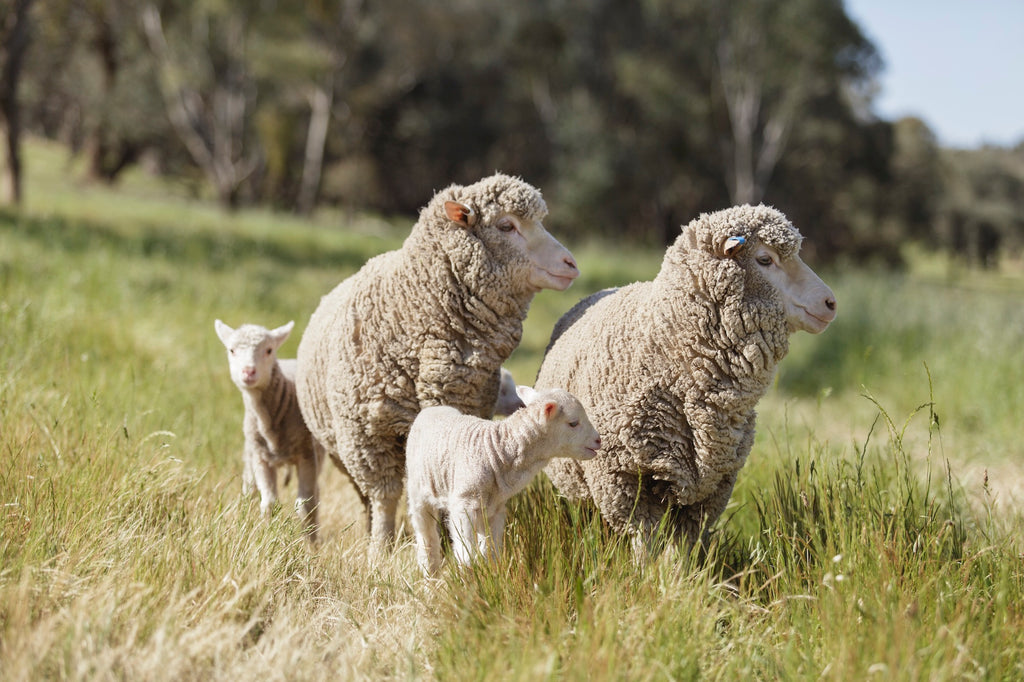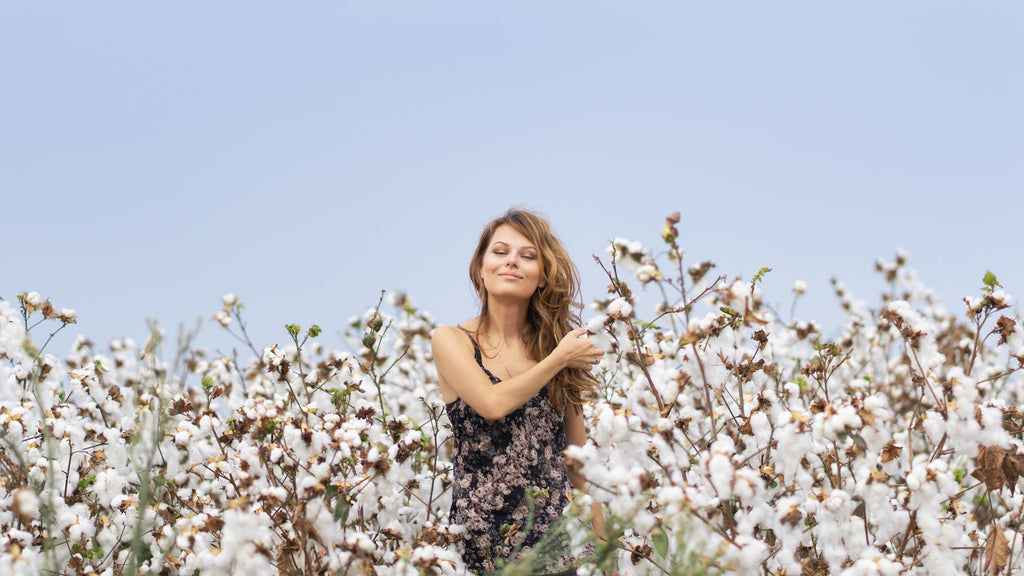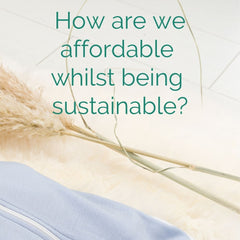Our Fabrics and Materials
We want to be transparent about our use of natural and sustainable materials, and to make it easy for you to learn about how and why these materials are better for our planet and for our children. Not only are these materials eco-friendly, but wearing natural fibres is healthier for the human body.
We also want to share with you our efforts to recycle fabric wastage or offcuts during the cutting process, the environmentally printing methods and water based inks we use, and our recent shift to cotton care labels - rather than polyester. Let's start with fabrics -
What fabrics do we use?
At Merineo, we use Australian merino wool and organic cotton. We do not use synthetics.
Australian Merino Wool
Merino wool is a natural and environmentally friendly fibre.

The circular life of wool begins when a sheep grows a new fleece every year. The wool is turned into garments using less energy than other fibres, kept in the wardrobe longer, requires less washing, and can be recycled for other uses, or re-sold. Eventually the garment is returned to the soil to biodegrade.
Australian woolgrowers use sustainable farming practices to produce the world’s finest wool from merino sheep. Merineo's founder, Claire, is from a wool growing farm -
"In Australia, our merino sheep are well looked after, and fed grass, hay, grains and fresh water to grow a new fleece every year. It's the very best of the fleece wool which is turned into fine apparel fabrics."
Unlike synthetics, which are produced in factories from non-renewable fossil energy, merino wool is a completely renewable and eco-friendly fibre:
- Wool uses 18% less energy than polyester and nearly 70% less water than cotton to produce 100 sweaters.
- Wool is 100% biodegradable so does not contribute to microplastic pollution in our oceans or on our land.
- Wool is the most reused and recyclable fibre on the planet of the major apparel fibres.

Above image: Merino sheep supplied courtesy of The Woolmark Company.
Non-mulesed merino wool
At Merineo we use certified non-mulesed merino wool. We use Australian merino wool, and we source our fabric from two mills, one in Italy, and the other in Australia.
Certifications
In selecting the world's softest merino wool fabrics to make into our baby products, we choose factories who invest heavily in sustainable and environmentally friendly processes, which extends also to the ethical management and welfare of the sheep growing the wool. Here is a summary of the two factories' certifications from which we currently source our merino fabrics -
|
Certification |
Australia | Italy |
|
Australian Merino Wool |
YES | YES |
|
ISO9001 Quality Management System - a certified standard based on a number of quality management principles including a strong customer focus, robust processes and continual improvement. |
YES |
|
|
ISO14001 Environmental Management System - a standard setting out the requirements for a business's environmental performance. |
YES |
YES |
|
Responsible Wool Standard- a certified standard addressing the welfare of woolgrowing sheep and the land they graze on. |
YES |
YES |
|
SustainaWool - an integrity scheme setting out standards for sheep health, farm management and wool clip preparation. |
YES |
|
|
Registered Environmental Management System pursuant to the European Regulation Eco Management and Audit Scheme I000227 - a policy governed by the European Commission protecting the environment. |
YES |
|
|
Authorised Economic Operator - a European Union based accreditation introduced by the World Customs Organisation embodying based on the principles of mutual transparency, correctness, fairness and responsibility relating to trade. |
YES |
|
|
Textile and Health Association member - an association protecting the health of consumers in the textile, fashion and foootwear industries. |
YES |
|
|
Certified B Corporation - a high standard of verified social and environmental performance, public transparency, and legal accountability to balance profit and purpose. B Corps are accelerating a global culture shift to redefine success in business and build a more inclusive and sustainable economy. |
YES |
|
|
4Sustainability - ID4S1001095 - certification of the adoption by fashion and luxury companies of a sustainability roadmap conditional on implementation of one or more initiatives, as well as to the complying with strict requirements that are continuously monitored. |
YES |
When you buy our merino wool baby sleeping bags and kids clothing, not only are you helping Australian woolgrowers, you are buying a sustainable fibre made into a fabric using sustainable methods and processes, protecting our earth, our oceans and our children.
Organic cotton
We are introducing organic cotton products into our collection. Organic cotton is grown without the use of toxic pesticides or fertilisers. These chemicals impact the quality and purity of the earth’s air, soil, water and the health of the people working closely with these pesticides.
Organic cotton relies heavily on natural rain - it uses 88% less water than regular cotton reducing pressure on local water sources and 62% less energy than conventional cotton farming.

Above image: Cotton field by Lena Hsvl from Pexels.
At Merineo we source our certified organic cotton fabrics from a knitting mill in Australia, which carries these certifications:
When you buy organic cotton you are creating change by helping with water conservation, and making a contribution to better soil and fairer livelihoods.
Textile recycling
During the fabric cutting process, there is wastage, sometimes called off-cuts. Our wastage is not discarded, but used to make sports equipment, including padding for boxing gloves and punching bags.
Water based inks
We print patterns on our organic cotton fabrics. The printing is done locally in Melbourne using the screen printing method and using water based inks. These 100% solvent free inks are environmentally friendly, and have been certified by the Soil Association in the UK, having successfully met the requirements of the Global Organic Textiles Standards (GOTS 6.0) for non-organic chemical inputs for use in organic textile processing. These water based inks have not been tested on animals, nor do they contain any animal products.

Above image: screen printing Merineo's animal prints on organic cotton fabric.
Garment labels
In our quest to achieve sustainability, we have transitioned from using polyester care labels to cotton labels as an additional step to help the planet. Note however, the fire safety labels on the sleeping bags are polyester in accordance with the relevant Australian Standard.
In every decision we make, we choose fabrics and materials that offer the most sustainable outcome.






